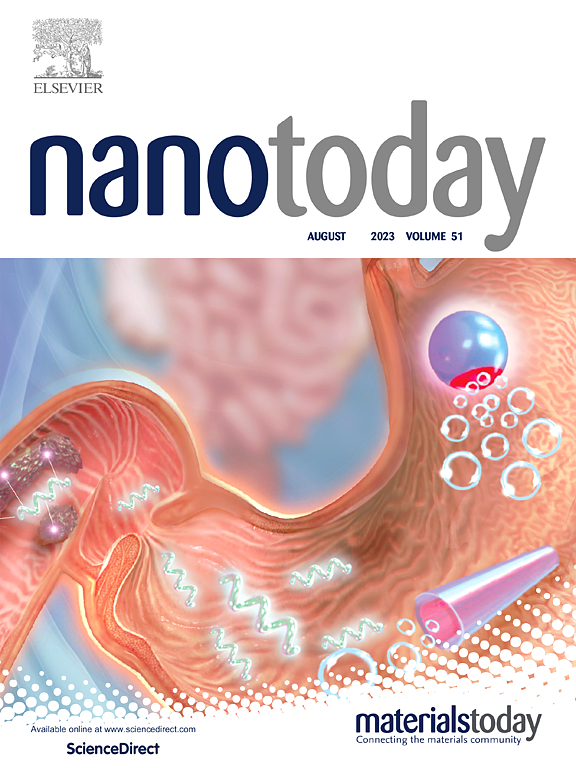刺激反应性高岭土胶体体在植物保护中抗病毒药物的主动递送
IF 10.9
1区 材料科学
Q1 CHEMISTRY, MULTIDISCIPLINARY
引用次数: 0
摘要
本研究介绍了一种利用高岭土纳米管(HNTs)稳定的热响应性油包水胶体体保护根抗托巴莫病毒的新方法。这些胶体体是通过使用HNTs、菜籽油、水和两种三乙基氧基硅烷(3-氨基丙基)三乙基氧基硅烷(APTES)和十二烷基三乙基氧基硅烷(DTES)的经济有效的工艺在原位形成的。亲水性APTES和疏水性DTES的结合可以精确控制乳液类型,并使形成稳定的胶体体。该系统的一个关键特点是太阳能触发的氯化磷酸三钠(Cl-TSP)的释放,这是一种抗病毒药物,可以消毒根部并灭活病毒颗粒。测定了Cl-TSP的释放量和释放时间,显示出控制和局部释放。该配方在番茄植株中提供了高保护,同时保持生物友好和环境安全。这项工作为有效和可持续的作物保护提供了一个智能释放平台。本文章由计算机程序翻译,如有差异,请以英文原文为准。
Stimuli-responsive halloysite colloidosomes for active delivery of antiviral agents in plant protection
This study introduces a novel root protection method against Tobamovirus, using thermally responsive water-in-oil colloidosomes stabilized by halloysite nanotubes (HNTs). These colloidosomes are formed in situ through a cost-effective process using HNTs, canola oil, water, and two trietoxysilanes: (3-aminopropyl)trietoxysilanes (APTES) and Dodecyltriethoxysilane (DTES). The combination of hydrophilic APTES and hydrophobic DTES allows precise control over emulsion type and enables the formation of stable colloidosomes. A key feature of this system is the solar-triggered release of chlorinated trisodium phosphate (Cl-TSP), an antiviral agent that disinfects the root area and inactivates viral particles. The amount and timing of Cl-TSP release were measured, demonstrating controlled and localized delivery. The formulation provided high protection in tomato plants, while remaining biofriendly and environmentally safe. This work offers a smart-release platform for effective and sustainable crop protection.
求助全文
通过发布文献求助,成功后即可免费获取论文全文。
去求助
来源期刊

Nano Today
工程技术-材料科学:综合
CiteScore
21.50
自引率
3.40%
发文量
305
审稿时长
40 days
期刊介绍:
Nano Today is a journal dedicated to publishing influential and innovative work in the field of nanoscience and technology. It covers a wide range of subject areas including biomaterials, materials chemistry, materials science, chemistry, bioengineering, biochemistry, genetics and molecular biology, engineering, and nanotechnology. The journal considers articles that inform readers about the latest research, breakthroughs, and topical issues in these fields. It provides comprehensive coverage through a mixture of peer-reviewed articles, research news, and information on key developments. Nano Today is abstracted and indexed in Science Citation Index, Ei Compendex, Embase, Scopus, and INSPEC.
 求助内容:
求助内容: 应助结果提醒方式:
应助结果提醒方式:


